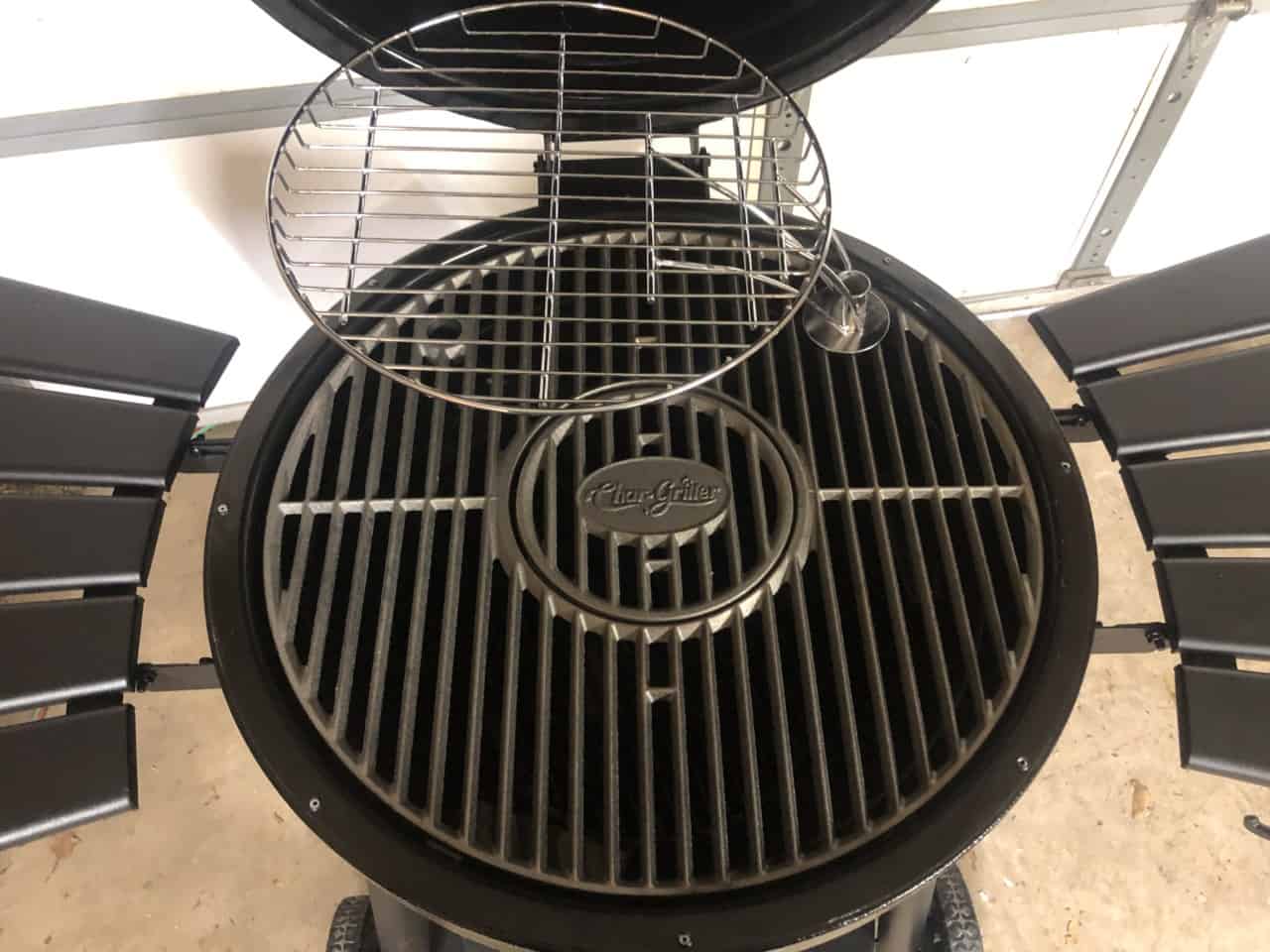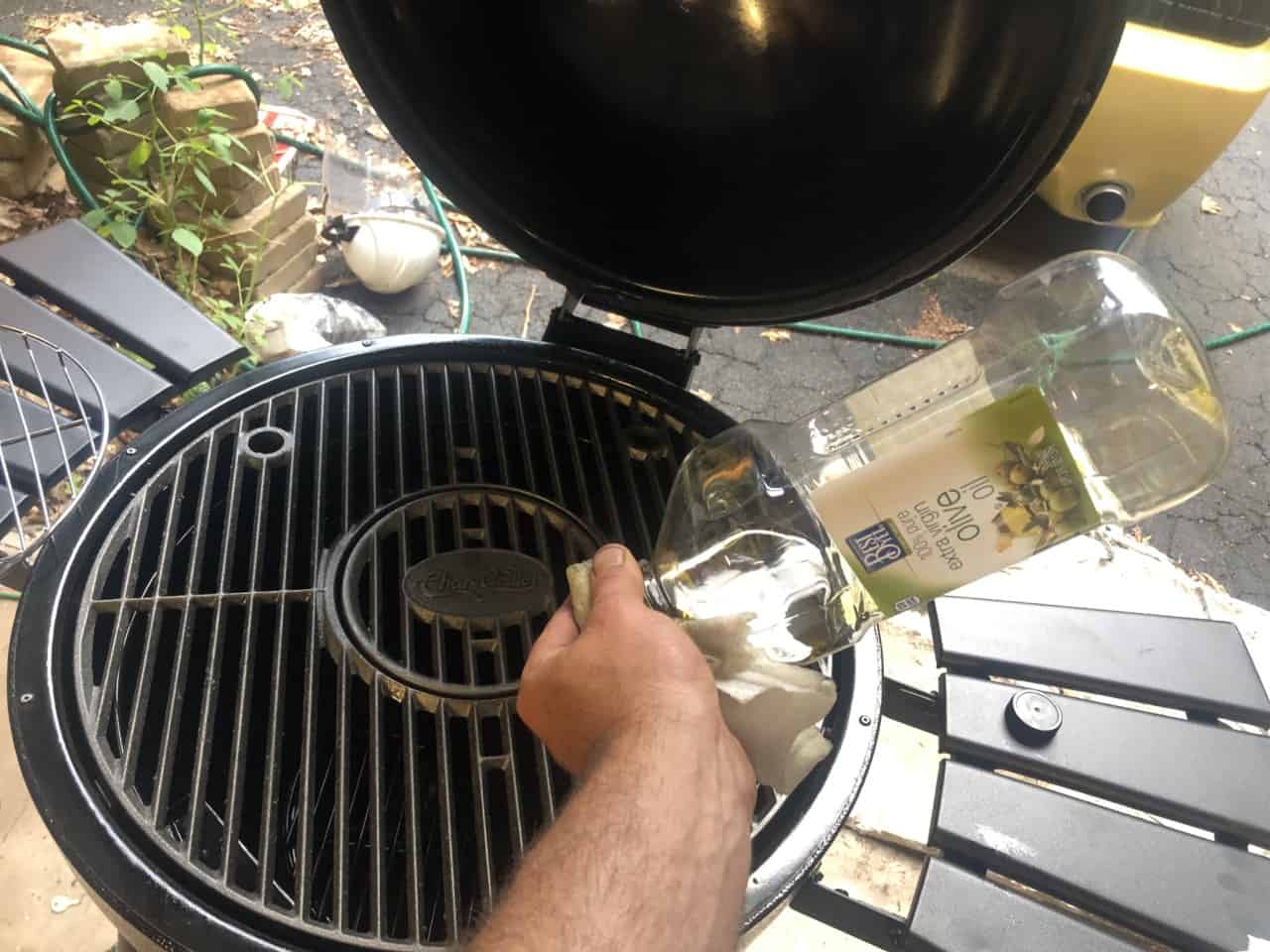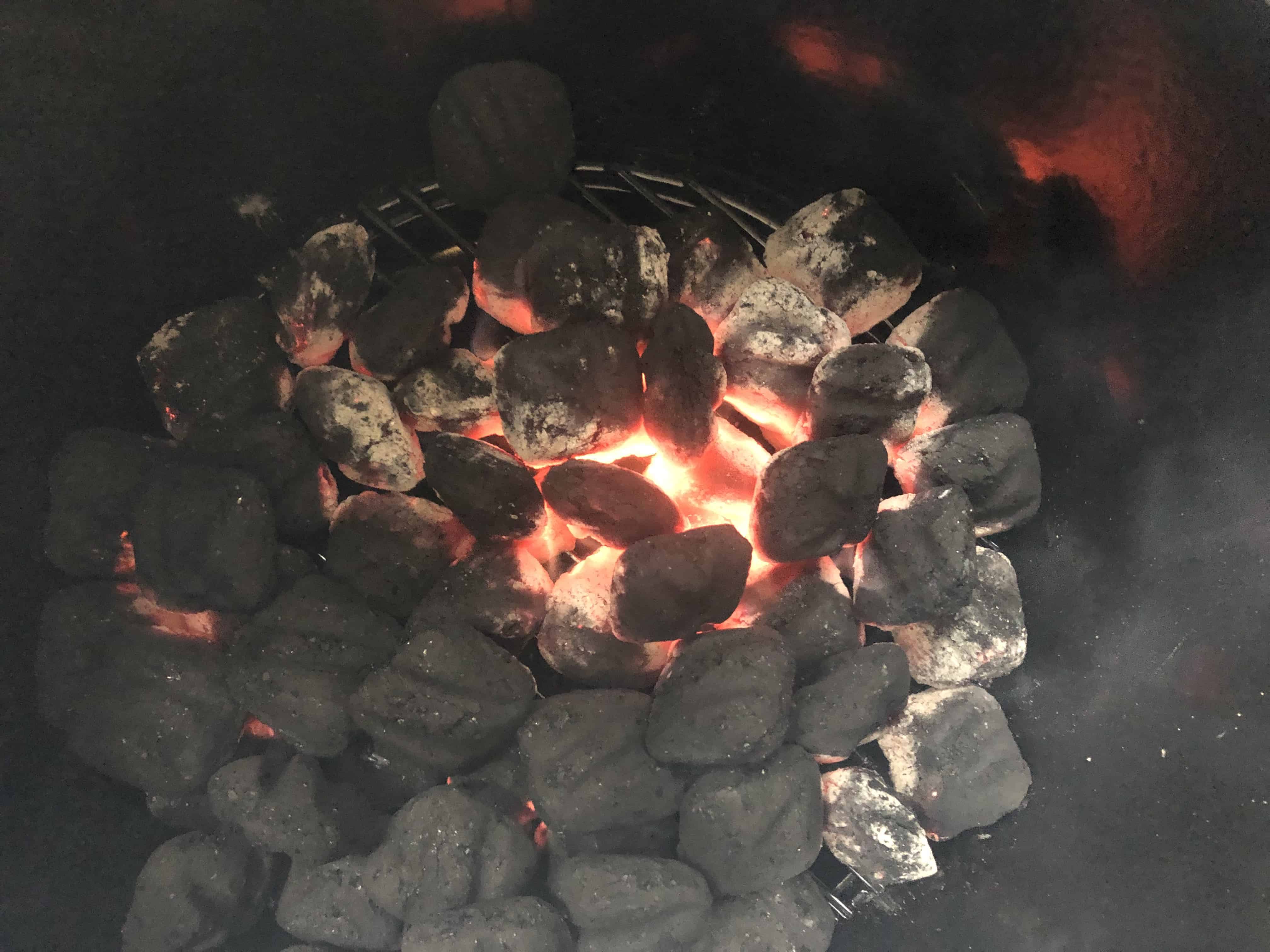
What Does It Mean to Season a Grill? Seasoning a grill is a must but yet most people have no idea what it means to season a grill. So let’s go over how to season a grill, the advantages of seasoning a grill, and everything you’re going to need to get the job done.
Seasoning a grill is a simple process of oiling and then heating your grill so that the oil will penetrate the pores of the metal. This is done for a number of reasons and has some great benefits as well.
Before getting started, take some time and clean the grill. Even a new grill should be cleaned. There’s going to be residual paint, manufacturing oils, metal shavings, and dust from shipping. None of those sound like something you’re going to want to add to your food.
Now that you have a nice clean grill, let’s get it seasoned. You’re going to need some oil, but not just any oil will do. You’re going to need a high heat cooking oil. Make sure you use oil with a high smoke point.
Oils That Work Well for Seasoning
You can use vegetable oils or any other types of cooking oils. The problem is that some oils can leave a bad taste or even break down over time and you’ll end up with a bad taste unexpectedly. So if you can, avoid using vegetable oil. If you have the means to get your hands on something better, I would highly recommend using that instead. Here are some oils to consider.
- Sunflower oil – Sunflower oil is a little pricier than others, but works well and has a neutral flavor. It has a smoke point of 450F.
- Canola oil – Canola oil is cheaper and more common, but can sometimes leave a bad taste on your grill. It has a smoke point of 400F.
- Corn oil – Corn oil is also a more commonly available oil and will work well. It has a smoke point of 450F.
- Peanut oil – Peanut oil is one you commonly see in the markets and one of my personal favorites to use. It has a smoke point of 450F.
- Soybean oil – Depending on what kind of market you have around you, you may be able to find soybean oil. This is also a good choice and it has a smoke point of 450F.
How To Season a Grill
Oiling

Now that you’ve picked an oil for seasoning your grill with, you’re going to need to get some paper towels or piece of cloth you don’t mind putting the oil on.
You’re going to need to coat the grill or at least the cooking grates with whatever oil you’ve chosen to use. Start by adding some of your oil to the paper towel or cloth rag and rubbing it evenly over the grill until you’re satisfied that everything is nicely coated. I know – you just got it all clean and now you’re going to cover it in oil, but it’s going to be worth it down the road.
Like I said above, you really only need to do the cooking grates. I like to do the inside of the lid as well to help stop it from rusting. It’s not really necessary to do so, but I’ve also had the same grill for seven years and it has no signs of rust on it.
Heating
Once you’re done coating it with the oil, you need to heat it up. If you’re using a charcoal or pellet grill, you’re going to need to get a fire going. If you’re using gas, you’re just going to need to turn the grill to high. Once you have your grill above the smoke point of the oil, leave it there for around 30 minutes.
If your new to using charcoal and need information on how to light charcoal you can check out my article How to Light a Charcoal Grill.
If you’re just doing the cooking grates on a charcoal or pellets grill and don’t want to do this in the grill since you’d have to wait for the charcoal to burn all the way out to be complete, another good option is to bring your grates inside and bake them in your oven for about 30 minutes.

Keep in mind if you do decide to do this in your oven that there will be smoke. Make sure you have a good ventilation hood to keep from filling your house up with smoke.
Now turn the grill off if you’re using gas, or wait for it to burn out for charcoal and let it cool down. Once it’s cooled off, you’re going to want to wipe it down to remove any lingering residue that was left behind. That’s it! Your grill is seasoned and you’re good to go.
If you notice an area doesn’t look the same as the rest, you may need to repeat the seasoning process. It may not have taken in that area for one reason or another.
It’s worth mentioning that this seasoning process can be done on any cast iron cookware, and really should be done for that matter. It’s a crucial step to ensure that your cookware will last for years to come.
Why Season a Grill
Why should you season your grill? Well for one it’s going to add a protective coating to your grill and help keep food from sticking to the grill. Not to mention it’s going to add another depth of flavor to all of the food you’re going to cook on it. If all that isn’t enough, it is also going to help prevent rust from forming on your grill as well.
Like I mentioned above, you don’t need to season the entire grill. You can just do the cooking grates and that will be fine. I prefer to do the entire inside to help with cleaning later on down the road.
When Should I Season My Grill
At the very least you should season your grill before its first use. This will ensure that you’re starting with a good clean grill and you’ve burned off all the chemicals from the manufacturing process.
After the initial seasoning, it’s all up to you. Some people like to redo the process once a year, others say once a month. I repeat the process if I start to notice that food is sticking to the cooking grates or if I see signs of rust on my cooking grates.
Don’t worry – it is not possible to over season your grill. You’ll just be doing a little extra work if you season it more often. But it’s good maintenance and your grill will be getting a good cleaning every time as well, and is that really a bad thing?
Do All Grills Need To Be Seasoned
Yes – all uncoated cooking grates should be seasoned. Whether your grille grates are cast iron or stainless steel, I still recommend seasoning them.
- Cast Iron Grates – Cast iron grates are a bit higher maintenance. Since it’s a porous metal, they may need to be seasoned more often. Because cast iron is a porous metal, you may not want to use a paper towel while seasoning them since fibers may become stuck to the grates. Consider something like a silicone brush or something else that’s smooth in nature. Trust me – it’s worth all the extra effort. There’s nothing like cooking on cast iron and as long as you season them properly, they’ll be non-stick right from the get-go.
- Stainless Grates – When it comes to stainless, you may notice it discolor after you season it. That’s okay. This is just the metal getting a patina to it. It will change over time, ranging from yellow to nearly black. The patina is a good thing – it’s metal trying to protect itself. In fact, if you’re used to cooking on cast iron grates, stainless grates may prove to be a bit stickier than what you’re used to. This is because the patina has not formed yet and seasoning them will help them along.
- Porcelain Coated Grates – Note that if your grill has porcelain grates, it won’t need a coat of oil, but will benefit from the burn-in process to remove any chemical impurities that were applied by the manufacturer.
What’s The Oil Doing
So the oils actually doing two different things: the first is polymerization and the second is carbonization.
Polymerization – is a process of reacting monomer molecules together in a chemical reaction to form polymer chains or three-dimensional networks. There are many forms of polymerization and different systems exist to categorize them.
Carbonization – To complete the seasoning, which involves laying down a carbon matrix on to the surface, heat must be applied slightly above the smoke point of the oil. If you do not heat above the smoke point, only the polymerized oil coat will be present instead of having an added rich black carbon matrix.
Hopefully, this answers all of your questions about seasoning your cast iron grill grates. In fact, you can even use these techniques on any cast iron pan you have in your house as well.
As always, happy grilling!
- Basting Brush –Your going to need a basting brush to spread sauces and marinades onto your chicken or ribs. Just like with all grilling accessories your going to need a brush that lets you keep your distance from the heat.
- Grill Cleaning Brush – Your going to need a good cleaning brush to clean up after your done grilling. It doesn’t matter how careful you are your going to get some sauce on the grates or some burned on food. If you don’t clean if off then the next time you grill it’s going to affect the taste of your food.


